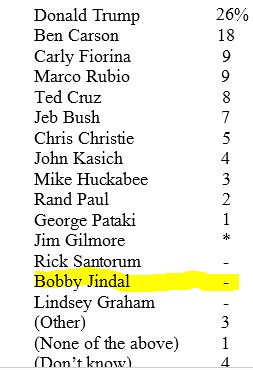And Teepell believes Jindal's relentless campaigning in the Hawkeye State will pay off.So Jindal is banking on a big showing in Iowa... which could happen. He's polling... not great but pretty OK there, comparatively speaking. Still, what happens after that? According to a FOX poll released today, Jindal is registering "_" nationally.
"This race will take a lot of twists and turns, but voters in Iowa take their responsibility seriously," he said. "Retail politics are very important in Iowa."
Perry's and Walker's campaigns flagged when their finances ran dry. Though Jindal has raised considerably less money than either of those candidates — about $10 million combined with the super PACs that support him — he's running his campaign like a hybrid car sips gas.
"I think it was (Democrat and former House Majority Leader) Dick Gephardt who said, 'Presidential campaigns don't end; they just run out of money,'" Teepell said. "Perry's expenses were too big. Walker raised a lot of money but built too big of a machine.
"We started out this thing by building a lean mean machine with a slow burn rate and low overhead."
Pearson Cross, a political science professor at the University of Louisiana at Lafayette, said Jindal's strategy has been clear from the start.
"Everything for him begins and ends in Iowa," Cross said. "He has to make a good enough showing there to move on. If he doesn't, it's over."

Hit big in Iowa and then maybe that changes. But it's far from automatic. If he doesn't pick up any momentum from there, what happens? Will there even be enough money to keep going? Well, sort of. There's definitely money, anyway. The cronies have seen to that.
This is one of the many connections between Jindal's presidential contributions and Louisiana boards: contracts and money. Those connections came into focus earlier this month, with the publication of a story by the Huffington Post about Jindal's supporters.In theory there exists a wall of separation between the campaign account and the Super PACs. But it's never been made clear just how strong that wall of separation really is. As Scott Walker's campaign began to sputter, there was some talk of testing the boundaries.
"Some of these folks are giving money for access," explains Jeremy Alford of the political news site LaPolitics.com. "Access doesn't come free; it certainly doesn't come cheap."
The most given for Jindal's presidency was by Galliano businessman Gary Chouest, who in one day this year wrote Jindal's super PAC a $1 million check. In 2008, Jindal announced the state would invest $10 million in the port of Terrebonne, which would help Chouest's company expand its operation.
So why are these powerful business people donating so much money in support of Jindal's presidential ambitions?
"That's a great question," Chervenak says. "It seems like a lot of money to give to a candidate who has no absolutely no chance to become president."
Jindal has a presidential campaign account. But that account has limits on the amount contributors can donate. So many are sending their money to two other accounts: Believe Again, a super PAC, and American Future Project, a 527. Both were created to support Jindal's presidential bid.
In the meantime, at the super PAC supporting Walker, Unintimidated PAC, top officials were preparing something revolutionary. Keith Gilkes, a former Walker chief of staff who was a leader of the super PAC, was legally barred from coordinating with the campaign. But in August, he began asking donors pointed questions about the campaign’s finances. He concluded that the situation was dire.Walker's campaign ran out of money. I wonder what happens to that $20 million now. There's no way to know. If nothing else, Super PACs are a pretty good way to grift money away from rich people who think they're buying "access."
The super PAC, which had about $20 million available, looked into hiring field staffers in South Carolina and other early states — preparing to take over many communications and political functions from the campaign, rather than staying in the traditional role of running TV ads.
Getting back to the Jindal story, it's still at least credible that the possibility of access is what they're selling over there.
"He could end up in a secretary's gig," Alford suggests. "He could end up higher up with the [Republican National Committee]. He could end up with an influential nonprofit, maybe even his own. So I think that there's a back end to consider on this, that, you know, maybe they're not paying to have access to the future president but to whatever position Bobby Jindal ends up in after this race."But in most of the cases Zurik catalogs in this story, these are collections on favors already paid out. For example,
Roy Martin of Alexandria gave $25,000 to Believe Again. Martin's companies have received more than $80 million in incentives and tax breaks from the state, including some approved a month after this donation.There are more if you'd like to read on including,
The owner of this TV station, Tom Benson, donated $25,000 to Jindal's super PACYeah, neat.
— skooks (@skooks) September 20, 2015
Maybe Jindal's campaign is officially sipping gas "like a hybrid car." But from the looks of things his PAC donors are the ones getting the real good mileage.
No comments:
Post a Comment